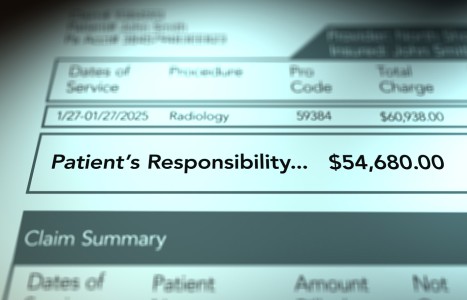Recent laws in New Jersey and California represent a disturbing trend that will negatively impact a practice’s ability to collect monies from patients, as well as expose them to significant penalties if the practice does not follow the mandatory guidelines to a T. Please be aware that a similar law may be coming to your state. The time to act is before the law is passed.
You Gotta Have A Plan
Recently, someone asked me what was the most common financial error made by high earning professionals. The question took me by surprise, and I really could not answer the question as there are just so many different financial mistakes that professionals can and often times do get into. However, upon reflection, I realized that just all of the mistakes that I have seen were really the symptom of a much larger problem: The doctor did not have a financial plan, and was tempted to take unrealistic risks to compensate for this.
But how can you make a financial plan, when you really cannot predict the future? Who would have thought back in 1979 that $1.45 gasoline would cost 97 cents in 1994? Who would have thought that mortgages would be in the seven percent range and that gold would be trading below $400 per ounce? On the other hand, who would have thought that four years at a private university would cost $100,000 or that the "average" American automobile would cost close to $20,000? And certainly no on could have predicted the radical changes now being contemplated in health care. Yes, it is true, you cannot predict the future. But, that does not mean that you throw your arms up in the air and let things happen in a random fashion. You still need a game plan. And your plan has to be monitored and adjusted at least twice per year.
The first step in preparing a financial plan is to set goals. Most of us wish to send our children to college and to have funds to retire. Perhaps there are also special goals that you may have, like endowing your favorite charity or purchasing a vacation home. Often these goals are not concrete, but merely fuzzy ideas of things that you might want to do someday. Write down your goals, then prioritize them. A liquid emergency fund consisting of three to six months expenses should be the first priority. Don't fool yourself here. Usually your total ACTUAL expenses are more than your total ESTIMATED expenses. The only way to honestly determine your monthly expenses is to go back and audit your business and personal checking accounts for the past six months. Once the emergency fund is set up, you can begin to think about funding longer term goals. The vacation home should come AFTER funding Junior's four-year trip to Harvard. Be realistic about your goals, but do not sell yourself short. The longer you have to fund your goals, the more likely you will be able to achieve them.
Next, examine your resources. Is your income likely to go up or to go down? How do you think health care reform will affect your practice? Do you expect an inheritance in the next few years? Will your spouse be able to return to work after your children are a certain age? All of these factors will help in determining which of your goals can be funded and how long it will take to fund them. Again, predicting the future is not an exact science by any means, but you have to have a gameplan to begin with.
After examining your resources, you have to determine which investments will work best for the time frame involved. Some advisors to the profession recommend putting all of your investable dollars in municipal bonds, letting your practice provide the growth. Other advisors recommend the use of growth investments, stocks or stock mutual funds, for funding long term goals. There are good and bad arguments for either type of plan, and that discussion is beyond the scope of this article. Realize, however, that either plan will require a certain monthly or annual contribution toward each goal. Generally, the use of growth investments will assume a greater average annual rate of increase, thus a lower required contribution. The trade off, however, is that growth investments are much more volatile than bonds, so you must count on at least 12 to 15 years before you need the money. Generally, stock investments have not lost money over a 15 year time period. Anything short of that time frame incurs a significant risk that your investment, at the time you need it, will be worth less than the sum of your contributions. In other words, if you wish to get the additional return that stock investments provide, you must be willing to be in that investment for the long haul to reduce the risk of market fluctuations to a minimal level.
Don't forget insurance needs. Be sure to have adequate disability, life, health, property, and liability coverage. Hopefully you will never need this coverage, but if you DO need it and don't have it, your entire financial plan can easily be ruined. Generally, if your emergency fund is adequate, it is prudent to buy insurance with higher deductibles. You want to insure and only pay for coverage against a disaster, while retaining the smaller financial risks of minor emergencies. And do not forget to get an "umbrella" policy that can insure you for beyond $1 million for non-professional liability exposures. This coverage is very inexpensive for the protection that it provides. And with the explosion of lawyers out there, million dollar judgments are becoming commonplace.
Finally, you have to monitor your plan. Review your plan twice per year. Perhaps Junior scored 1600 on his SAT test and Harvard grants him a four-year all expenses paid scholarship. Or maybe your desire for a vacation home has changed, and you would rather no use that money to fund annual vacations in places around the globe. Or perhaps illness forces you to slow down and to semi-retire. Whatever the future brings, you will have options available to you because of earlier planning.
By the way, don't forget debt reduction as part of your overall plan. It really does not make sense to invest in stocks or bonds if you can get a good risk free rate of return just by paying down loans and mortgages. The secret here is to continue to invest the monthly payment amount once you pay off a loan. And try to pay cash for any new purchases after reducing the original debt. New doctors will not be able to do this, but after 7 to 10 years of implementing your well prepared financial plan, paying cash should be no problem.
The purpose of this article was to present the necessity of doing a financial plan. I have also outlined the major steps in doing a plan. By having a written plan, you will be less inclined to "roll the dice" on a hot stock tip that you heard about at a cocktail party. You know where you are going, financially, and you commit your funds to your plan. You greatly reduce your temptation of making a serious financial error in hopes of "hitting the big one." While it is not possible to determine the exact picture of the future, you can get a general feel for where you want to go and develop a plan to get there. Once you arrive, you will then have options to deal with the specific details of the day in a way that would otherwise not be available.
Bernard D. Newman, DC
Pittsburgh, Pennsylvania


